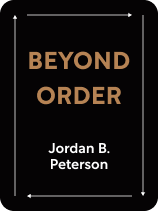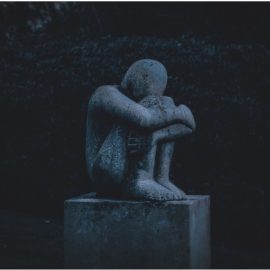

This article is an excerpt from the Shortform book guide to "Beyond Order" by Jordan Peterson. Shortform has the world's best summaries and analyses of books you should be reading.
Like this article? Sign up for a free trial here.
Do you have any fine art in your house? How much attention do you pay to the person you’re becoming? Do you have a date scheduled with your significant other?
Beyond Order is Jordan B. Peterson’s hard-hitting, no-nonsense guide to navigating the chaos of our difficult world and living a life of excellence. In it, Peterson offers 12 rules to help you reduce the chaos in your life, create order, and live responsibly.
Keep reading for the Beyond Order: 12 More Rules for Life list, and apply them to your life with an exercise at the end.
12 More Rules for Life List
Peterson’s rules center on ideas of chaos, change, and order. They cover how and why to listen to your conscience, how to find the courage to take responsibility for yourself and your loved ones, and how to show up for life as fully as you can. Let’s take a look at each rule on the Beyond Order: 12 More Rules for Life list.
Rule #1
Do not carelessly denigrate social institutions or creative achievement.
Starting with a discussion of the world at large, Peterson argues in Rule #1 that we should respect our traditional social institutions while also embracing the reality of achievement and change. These are complementary forces: Traditions ground us and connect us to the past, while creative thought challenges and renews facets of society that have stagnated.
Rule #2
Imagine who you could be, and then aim single-mindedly at that.
In life, you need to know what direction is most worth heading in. In Rule #2, Peterson addresses how to determine what’s worth doing and how to become everything you can. Further, he asserts that, because our world is full of suffering, we’re each obligated to become the best people that we can be. By doing so, we can help reduce suffering and bring some light to the world.
Rule #3
Do not hide unwanted things in the fog.
Peterson argues in Rule #3 that you shouldn’t ignore chronic stressors, lest they become larger issues. Daily life is full of tiny, repeating pricks of stress—kids to care for, work colleagues to deal with, imperfect relationships to manage, and chores to juggle. If you let these pricks build up, they’ll amount to tons of stress over time.
Rule #4
Notice that opportunity lurks where responsibility has been abdicated.
In Peterson’s Rule #4, he contends that assuming personal responsibility for your life will bring you meaning and fulfillment. He argues that meaning in life doesn’t come from happiness, as is commonly believed. That’s because happiness feels good for only a moment or two. And, having previously felt good doesn’t help much when life gets tough. In the midst of a dark, difficult experience, that earlier happiness will be just a memory.
Rule #5
Do not do what you hate.
You sometimes come up against ideas that you just can’t agree with. In Rule #5, Peterson discusses how to handle these ideological conflicts when they start to compromise your sense of what’s right and wrong. In life and work, you’ll sometimes find yourself in positions that compromise or challenge your morals. If you accept these situations, Peterson says, you’ll become passive and, over time, suffer from repressed emotions. Specifically, you’ll experience inner emotional conflict and struggle to respect yourself. That is, since you failed to stand up for what you thought was right, you won’t be able to see yourself as morally upright or respectable.
Rule #6
If workplace ideologies or stances continue to conflict with your morals, you might find more help in Peterson’s next rule, where he suggests avoiding ideology altogether. Peterson explains that ideologies are simplistic accounts of how the world works and of what’s right versus wrong. In essence, an ideology 1) declares the cause of all suffering, 2) claims to have the solution, and 3) offers the moral high ground to people who join the tribe. Peterson says that ideologies misrepresent the complexity of the real world.
To avoid this problem, abandon ideology and choose to grapple with the true complexity of the world. Educate yourself, reading and learning across ideological boundaries. Figure out your own life before you try to tell other people how to live. Over time, you’ll develop your own thinking and become able to deal with larger and more complex problems in the real world.
Rule #7
Work as hard as you possibly can on at least one thing, and see what happens.
While following your conscience may work wonders, doing so is no use if you aren’t consistent. Consistency, Peterson argues, is a necessary precondition of success. You won’t get anywhere if you don’t commit to something and stick to that path.
To become consistent, pick a direction and stay the course single-mindedly. As you go, you’ll need to confront the trials and challenges of that path. According to Peterson, these challenges will test your commitment and show you what you’re made of. When you give yourself no options but to follow through, that pressure will make you strong enough to handle anything.
Rule #8
Try to make one room in your home as beautiful as possible.
Peterson asserts in Rule #8 that beauty plays a vital role in life: It connects us to the sense of wonder and mystery that we felt as children. Without making room for beauty, we can lose touch with the mystery of life and the wonder all around us.
Peterson argues that fine art can reconnect us with the beauty we saw as children. Great artists retain their child-like connection to wonder and can translate that unclouded perception into art. So, make room for beauty in your life by getting at least one work of art that truly calls to you.
Rule #9
If old memories still upset you, write them down carefully and completely.
In life, you face obstacles along your path in the form of painful memories of past experiences. These experiences, Peterson argues, linger within us and hinder our growth. But, consciously processing those painful emotions has a cathartic effect that catalyzes further growth.
In Peterson’s view, you can effectively process old emotional wounds by revisiting them and working through them in writing. Specifically, Peterson advises that you face up to the pain of such a memory and reinterpret it from an adult perspective.
Rule #10
Plan and work diligently to maintain the romance in your relationship.
Peterson asserts in Rule #10 that monogamous marriage is the best way to structure your adult social life. He argues that, as of yet, human societies haven’t devised a better basic social unit than married pairs. With a spouse and family, you have a support system that will always be there for you in our often cold, harsh world.
Peterson asserts that, once you’re married, you should make two commitments: Take divorce off the table, and communicate openly and consistently. Hash out all the details about how you’ll live your lives together; it’s important to get your routines right. With your practical matters squared away, Peterson recommends that you plan your romantic life. Schedule regular date nights, and use these times to be fully present with your spouse.
Rule #11
Do not allow yourself to become resentful, deceitful, or arrogant.
In Rule #11, Peterson argues that we must all avoid slipping into immoral behavior due to frustration with life. If, instead, you choose courage and listen to your conscience, you’ll grow strong and able to navigate the trials of life. In contrast, acting immorally will lead you astray and distort your sense of right and wrong.
Rule #12
Be grateful in spite of your suffering.
Continuing from Rule #11, Peterson explains that it’s all too easy to become bitter and dissatisfied with life. Darkness and suffering are unavoidable, and many people end up unhappy with themselves and with life in general. However, falling into despair does you no good and can cause you to act out the darkness within you. This, in turn, will worsen your life and the lives of those around you.
The alternative, Peterson argues, is to choose gratitude in the face of the great darkness and suffering of life. This doesn’t mean denying that life is full of suffering. Rather, it means acknowledging the darkness and finding gratitude despite it. Even when life seems bleak, you can look around and focus on what you do have. Thinking like this gives you the strength to go on even during hard times.
Exercise: Apply Peterson’s Rules
While Peterson gives 12 rules and extensive reasoning for each, it’s important to do one thing at a time to get the best results. In this exercise, narrow down the rules that feel relevant to your life and choose one to try.
- Having read through Peterson’s 12 rules, which ones feel most immediately relevant to your current life situation? Why?
- Think of a challenge you’re facing. Briefly write out the challenge, and then identify a rule or two that could help.
- For each rule you identified in the last question, work out how it applies in your specific context. Briefly, how might you apply or adapt Peterson’s rule to the specific challenge in your life?

———End of Preview———
Like what you just read? Read the rest of the world's best book summary and analysis of Jordan Peterson's "Beyond Order" at Shortform.
Here's what you'll find in our full Beyond Order summary:
- A no-nonsense guide to navigating the chaos of our difficult world
- How and why you should listen to your conscience
- How to show up for life as fully as you can






